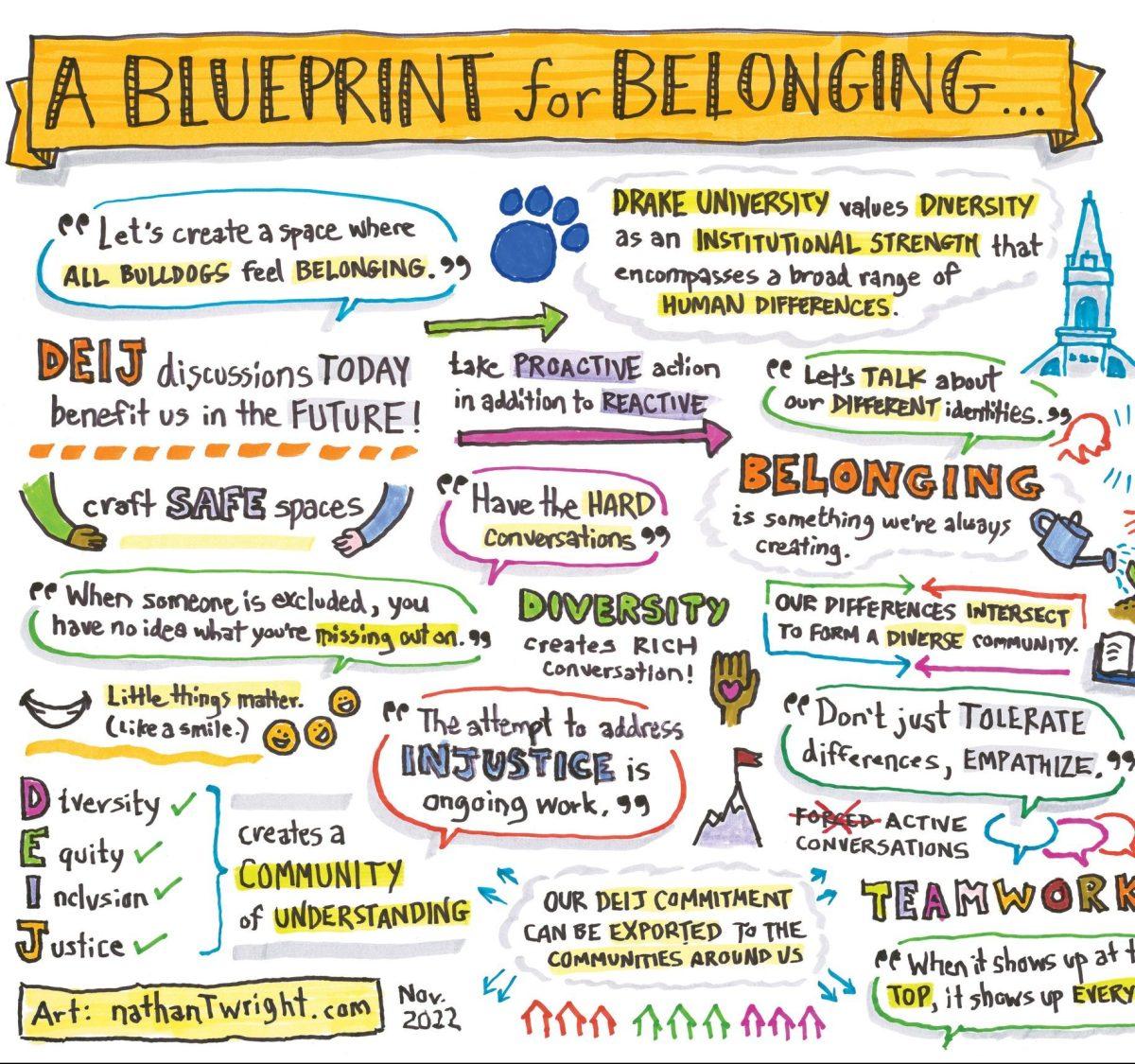After receiving student feedback, Drake has remodeled its first-year “Bulldog Foundations” course, renaming it “Blueprint for Success.”
Diversity, equity and inclusion learning now covers five weeks of the course instead of three, according to Melissa Sturm-Smith, associate provost for academic excellence and student success. These topics include allyship, Drake’s commitment to equity and inclusion and “Racism and Resistance in DSM and Des Moines,” the course syllabus says.
“A lot of what Blueprint for Success is, is an introduction to a lot of different topics. We focus a lot on resources,” Sturm-Smith said. “Making sure students understand what resources are available, how to access them [and] where they’re located. And then also some habits and some skills and ideas that then students can dig into a little bit deeper.”
The class takes place once a week for 50 minutes, Sturm-Smith said. This is the third year all first-year students have been required to take the course.
A “total overhaul”
After seeing concerns on course evaluations, Drake invited students who had taken Bulldog Foundations in fall 2021 to give feedback in focus groups.
Sturm-Smith said the “total overhaul” of the class was also inspired by feedback from town hall conversations that took place in February, after the university told the campus community that vandalism with racist speech had been found in Cowles Library and Crawford Hall.
“A combination of those conversations and the focus groups informed in particular the DEI component of the course, but we basically revamped the entire 11-week course,” Sturm-Smith said. “So one of the big things was, students were asking that we expand the focus of DEIJ [Diversity, Equity, Inclusion and Justice] in the course.”
Blueprint for Success instructors have also met with Associate Provost of Campus Equity and Inclusion Dr. Jennifer Harvey to discuss their concerns and questions about the DEI modules planned for later in the course. Jazlin Coley-Smith, Drake’s director of equity and inclusion, said the modules include interactive elements designed to engage students without overwhelming students.
“One of the modules is built around like a DEI trivia, and instead of having someone sit here and tell you this is what allyship is, ‘This is what…racism is, this is how this plays out in our community,’ we’re trying to figure out interactive and engaging ways to share this information,” Coley-Smith said.
“Emotional awareness,” Paint It Black and other DEI topics
The first DEI class of the course focuses on emotional awareness, “like thinking about how we don’t all have practice in having some of these conversations,” Sturm-Smith said. The second focuses on terminology, as well as “what’s available to support DEIJ work for them and for the campus community as a whole.”
“We focused in specifically on diversity, equity, inclusion and justice, and getting common definitions around what those mean and examples of what that looks like at Drake,” Sturm-Smith said.
The next week features a video by Jennifer Harvey, Sturm-Smith said. The video includes some of Drake’s past and future DEI work.
The following week focuses on the history of the “Paint It Black” movement on Drake’s campus. This week of the course also focuses on “historical and contemporary manifestations of racism and resistance to racism in Des Moines” and reflection on “the racial context of Drake and Des Moines,” according to the syllabus.
In 2018, following incidents on campus, Drake’s Painted Street was painted black to show commitment to students of color, The Times-Delphic reported. Blueprint for Success has a fact sheet about the initial incidents around “Paint It Black” and the essays of three students who were involved, Sturm-Smith said.
“We have some discussion about the movement and about what that means and the recommitment that we do every spring on the campus,” Sturm-Smith said. “And then week 11 is about allyship and what are ways that we can serve alongside marginalized populations.”
Drake also planned to hold community conversations where students would engage with Drake’s equity and inclusion statement, Sturm-Smith said in an interview on Oct. 28. Faculty and staff were invited to participate, and an art piece would be created as a result of the conversations.
Preparing students for life at Drake
Aside from the DEI focus, Sturm-Smith said the course had a discussion/conversation day to address students’ desire to talk about the transition between high school and college. Additionally, each section has a peer mentor working in the class.
For two weeks of the course, students pick the topics they want to cover out of five choices, Sturm-Smith said. Blueprint for Success also addresses Blackboard, Starfish, printing at Drake, mental health awareness and self-care, as well as getting organized.
“Because that’s one of the top things we hear from students is challenges around, just like having a system and managing time and figuring out not just how to get work done, but like eating and sleeping and socializing and exercising, right, like all those really important things,” Sturm-Smith said.
News Editor Mackenzie Swenson contributed to this article.
This article is the third in a Times-Delphic series about diversity, equity and inclusion efforts on Drake’s campus. Previously, the Times-Delphic reported on an upcoming incident response plan, a new Equity and Inclusion requirement in the curriculum, and more.








